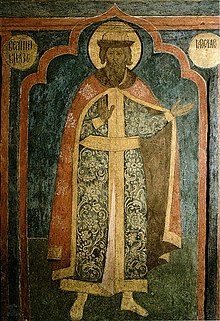Yaroslav of Tver
| Yaroslav III Yaroslavich | |
|---|---|
 Yaroslav in the Cathedral of the Archangel in Moscow | |
| Grand Prince of Vladimir | |
| Reign | 1263–1271 |
| Predecessor | Alexander Nevsky |
| Successor | Vasily of Kostroma |
| Prince of Tver | |
| Reign | 1247–1271 |
| Predecessor | Monarchy established |
| Successor | Svyatoslav Yaroslavich |
| Prince of Novgorod | |
| Reign | 1255–1256 |
| Predecessor | Vasily Alexandrovich |
| Successor | Vasily Alexandrovich |
| Reign | 1266–1267 |
| Predecessor | Dmitry of Pereslavl |
| Successor | Yuri Andreyevich |
| Born | 1230 |
| Died | 9 September 1271 (aged 40/41) |
| Spouse | Xenia of Tarusa |
| Issue | Mikhail of Tver |
| House | Yurievichi Yaroslavichi of Tver (founder)[1] |
| Father | Yaroslav II of Vladimir |
| Mother | Fedosia Igorevna |
Yaroslav III Yaroslavich (Russian: Ярослав Ярославич; 1230–1271)[2] was the first Prince of Tver from 1247,[3][4] and Grand Prince of Vladimir from 1263 until his death in 1271.[5][6][7] He was the progenitor of the Yaroslavichi of Tver; all the later princes of Tver descended from him.[1][8]
Yaroslav and his son Mikhail presided over Tver's transformation into one of the greatest centres of power in medieval Russia which would compete with Moscow.[9]
Life
Yaroslav was a son of Yaroslav II and a younger brother of Alexander Nevsky.[5] In 1247, he received from his uncle the town of Tver.[3][10]
In 1252, Yaroslav and his brother Andrey seized Alexander's capital, Pereslavl-Zalessky. Reinforced by Tatar units,[11] Alexander presently fought it back, taking prisoner Yaroslav's children and leaving his wife as a casualty on the field of battle.
Yaroslav fled to Ladoga,[11] and in 1255, he became the prince of Novgorod after Alexander's son Vasily was expelled; Alexander returned to the city to dismiss the posadnik and by the next year, Vasily was sent back to reign.[11] In 1258, he visited the khan's capital in Sarai, and two years later led the Novgorod army against the Teutonic Knights.
Upon Alexander's death in 1263, Yaroslav quarrelled with Andrey as to who should become Grand Prince next. They went to the Golden Horde for arbitration, which was in favour of Yaroslav. The latter, however, settled in Novgorod and married a daughter of one local boyar. Various Novgorodian factions still conspired against him and sought to place his brother Vasily of Kostroma or Alexander's son Dmitri of Pereslavl on the throne.
In 1270, the armies of three princes stood for a week near the town of Staraya Russa, ready for battle. The metropolitan, however, managed to reconcile them. Yaroslav, on surrendering Novgorod to his nephew, accompanied him to Sarai. He died on his way back to Tver on 9 September 1271 and was succeeded in Tver by his eldest son Svyatoslav and then by Mikhail.
See also
References
- ^ a b Isoaho 2006, p. 215.
- ^ Biographical Index of the Middle Ages. Walter de Gruyter. 1 March 2011. p. 567. ISBN 978-3-11-091416-0.
- ^ a b Langer, Lawrence N. (15 September 2021). Historical Dictionary of Medieval Russia. Rowman & Littlefield. p. 222. ISBN 978-1-5381-1942-6.
- ^ Fennell, John (13 October 2014). The Crisis of Medieval Russia 1200-1304. Routledge. p. 127. ISBN 978-1-317-87314-3.
- ^ a b Fennell 2022, p. 52.
- ^ Lawson, Bethia Jane (1900). A Short Outline of the History of Russia. T. & A. Constable. pp. 91–92.
- ^ Feldbrugge, Ferdinand Joseph Maria (2009). Law in Medieval Russia. BRILL. p. 202. ISBN 978-90-04-16985-2.
- ^ Fennell 2022, p. 225.
- ^ Fennell 2022, p. 53.
- ^ Martin 2007, p. 176.
- ^ a b c Fennell, John L. (14 January 2014). A History of the Russian Church to 1488. Routledge. p. 123. ISBN 978-1-317-89720-0.
Bibliography
- Fennell, John (23 September 2022). The Emergence of Moscow, 1304-1359. University of California Press. p. 352. ISBN 978-0-520-37358-7.
- Isoaho, Mari (2006). The Image of Aleksandr Nevskiy in Medieval Russia: Warrior and Saint. Leiden: Brill. p. 417. ISBN 9789047409496. Retrieved 21 August 2023.
- Martin, Janet (2007). Medieval Russia: 980–1584. Second Edition. E-book. Cambridge: Cambridge University Press. ISBN 978-0-511-36800-4.
